Are you losing your
child to their phone?
End the constant fight over screen time. Get a coach to transform the bad habits.
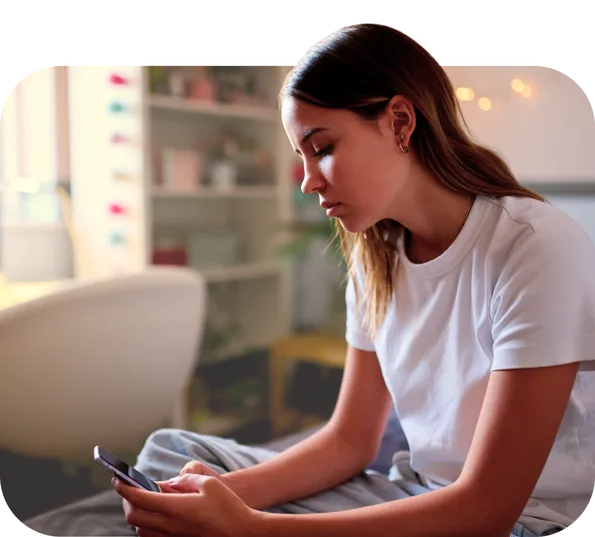
It's not just a phone, it's a giant industry,
fine-tuned to steal their attention
The smartest minds spend billions of dollars to keep your child addicted to their phone.
What chance does your child have?
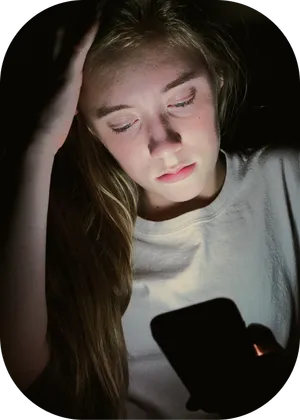
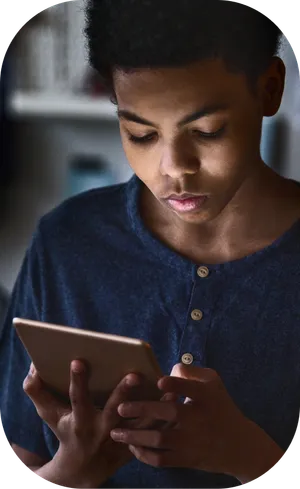
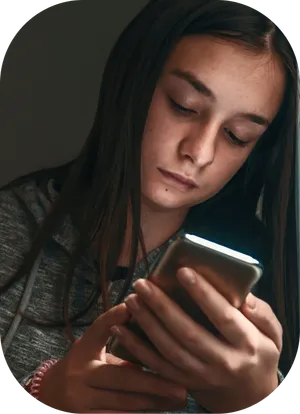
Every day, an average US teenager:
Spends 5 hours on social media
Spends 9 hours on screens
Picks up their phone 150 times
The consequences are scary
Skyrocketing anxiety and depression [1]
Attention and focus difficulties [2]
Impaired memory formation [3]
Reduced cognitive ability [4]
Sleep disruption [5]
Screen time coaching launching this fall
Help your child reclaim their attention.
Get a coach.
Let a coach manage screen time
You set the boundaries,
we'll do the accountabiliity
Replace bad habits with good ones
Gradually replace the bad habits
with positive life and study habits
Earn screen time through discipline
By demonstrating consistent progress,
your child is slowly given more autonomy
Screen time coaching launching this fall
What are the good habits?
Coaches make this a fun, positive journey.
Invite a friend over, put your
phones away in a basket
Exchange 10 minutes of Tiktok,
for 10 minutes of active reading
Make the bed and get ready
instead of scrolling on Instagram
+34 more life and study habits,
built one tiny step per day
How do coaches change behavior?
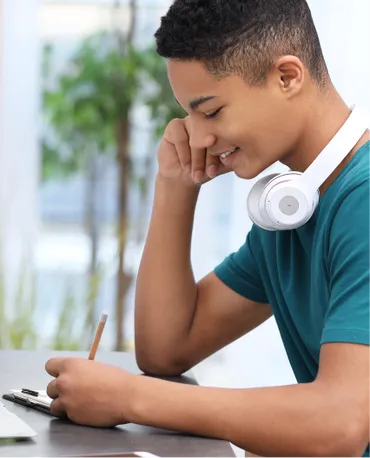
Your child gets one tiny step from their coach daily
The steps are designed to gradually replace bad habits with positive ones.
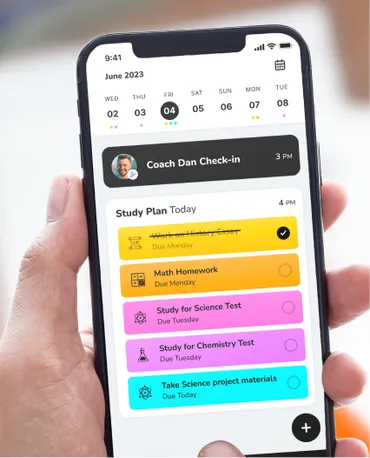
Your child needs to prove they're doing the steps
Using our app, take a photo as proof, use the study tools or tracking features.
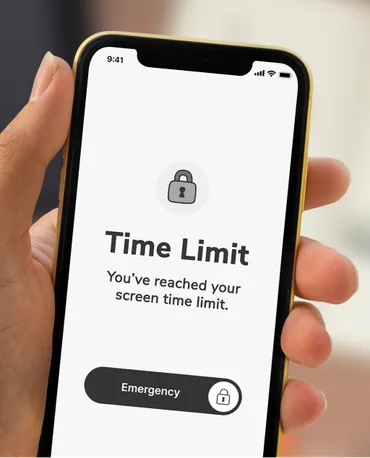
Coaches adjust screen time limits accordingly
Earns rewards and greater screen time freedom with consistent progress.
How do coaches actually
manage screen time?
Here's an example of it in action
The coach and your child set a goal: no screens after 10pm.
Our app tracks the screen time data.
Coaches can remotely block or adjust limits on apps/sites.
Achieving goals earns your child rewards and more flexibility.
Missing goals means greater screen time restrictions.
Your child can negotiate with their coach instead of you.
Other important details:
- Parents can override limits.
- Emergency contacts are never blocked.
-
We handle your child's data in compliance with
COPPA,
GDPR,
and other child data protection laws.
Your child doesn't stand a fighting chance
They are up against a machine designed to exploit their vulnerabilities.
Percent of U.S. undergraduates with anxiety/depression.
(Source: American College Health Association.)
Screen time coaching launching this fall
Let us share the burden with you
Be their parent again, not the police.
🚨🚨
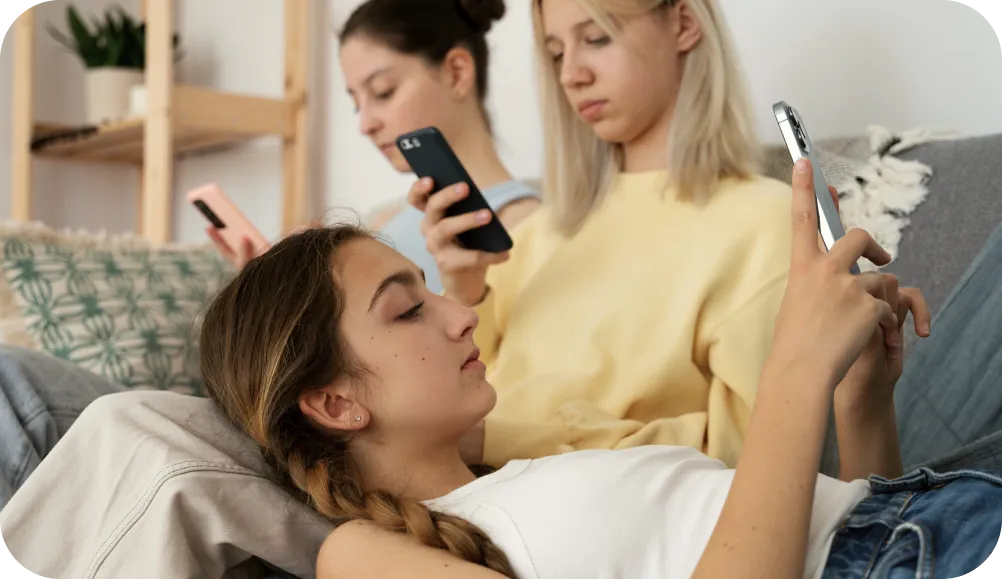
Managing your child's screen time alone is exhausting. Parental controls fail, kids find ways around passwords, and the constant nagging wears you down.
A coach can step in where technology falls short—creating lasting change by guiding your child to build healthier habits so you can focus on being their parent, not their enemy.
Get a coach and help your child regain control
Join our early pilot and help your child beat their screen dependency and build healthier habits.
A coach will check in with your child daily:
Develop a personalized plan based on their screen time habits
Gradually decrease screen time (the key to sustainability)
Motivate your child to hit their screen time goals with rewards
Keep your child accountable via the Coachbit app's tracking system
Reduce your child's dependency on screens
Swap bad habits for healthier ones!
Screen time coaching launching this fall
References
Skyrocketing Anxiety and Depression [1]
- Carter, B., Ahmed, N., Cassidy, O., et al. (2024). "There's more to life than staring at a small screen: A mixed methods cohort study of problematic smartphone use and the relationship to anxiety, depression, and sleep in students aged 13-16 years old". UKBMJ Mental Health, 27.
- Mougharbel, F., Chaput, J.P., Sampasa-Kanyinga, H., Colman, I., Leatherdale, S.T., Patte, K.A., & Goldfield, G.S. (2023). "Longitudinal associations between different types of screen use and depression and anxiety symptoms in adolescents." Frontiers in Public Health, 11.
- Tang, S., Werner-Seidler, A., Torok, M., Mackinnon, A.J., & Christensen, H. (2021). "The relationship between screen time and mental health in young people: A systematic review of longitudinal studies." Clinical Psychology Review, 86.
- Zink, J., Belcher, B.R., Imm, K., & Leventhal, A.M. (2020). "The relationship between screen-based sedentary behaviors and symptoms of depression and anxiety in youth: A systematic review of moderating variables." BMC Public Health, 20, 472.
- Orben, A. (2020). "Teenagers, screens and social media: A narrative review of reviews and key studies." Social Psychiatry and Psychiatric Epidemiology, 55(4), 407-414.
- Elhai, J.D., Levine, J.C., Dvorak, R.D., & Hall, B.J. (2016). "Fear of missing out, need for touch, anxiety and depression are related to problematic smartphone use." Computers in Human Behavior, 63, 509-516.
Attention and Focus Difficulties [2]
- Kim, H.J., Min, J.Y., Min, K.B., Lee, T.J., & Yoo, S. (2018). "Relationship among family environment, self-control, friendship quality, and adolescents' smartphone addiction in South Korea: Findings from nationwide data." PLOS ONE, 13(2).
- Skowronek, J., Seifert, A., & Lindberg, S. (2023). "The mere presence of a smartphone reduces basal attentional performance." Scientific Reports, 13.
- Wacks, Y., & Weinstein, A.M. (2021). "Excessive smartphone use is associated with health problems in adolescents and young adults." Frontiers in Psychiatry, 12, 762.
Impaired Memory Formation [3]
- Tanil, C.T., & Yong, M.H. (2020). "Mobile phones: The effect of its presence on learning and memory." PLOS ONE, 15(8).
- Ward, A.F., Duke, K., Gneezy, A., & Bos, M.W. (2017). "Brain drain: The mere presence of one's own smartphone reduces available cognitive capacity." Journal of the Association for Consumer Research, 2(2), 140-154.
Reduced Cognitive Ability [4]
- Troll, E.S., Friese, M., & Loschelder, D.D. (2021). "How students' self-control and smartphone-use explain their academic performance." Computers in Human Behavior, 117.
- Niu, E.F., Shi, X.H., Zhang, Z.L., Yang, W.C., Jin, S.Y., & Sun, X.J. (2022). "Can smartphone presence affect cognitive function? The moderating role of fear of missing out." Computers in Human Behavior, 136.
Sleep Disruption [5]
- Carter, B., Rees, P., Hale, L., Bhattacharjee, D., & Paradkar, M.S. (2016). "Association between portable screen-based media device access or use and sleep outcomes: A systematic review and meta-analysis." JAMA Pediatrics, 170(12), 1202-1208.
- Lemola, S., Perkinson-Gloor, N., Brand, S., Dewald-Kaufmann, J.F., & Grob, A. (2015). "Adolescents' electronic media use at night, sleep disturbance, and depressive symptoms in the smartphone age." Journal of Youth and Adolescence, 44(2), 405-418.